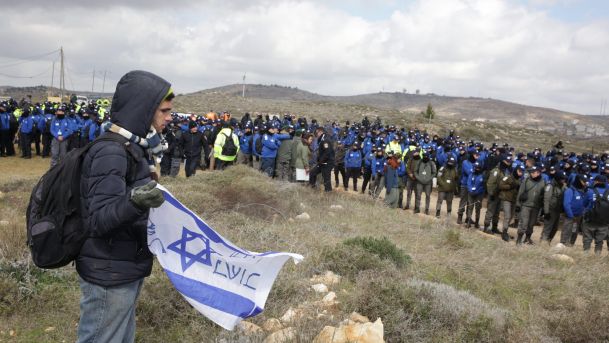The intolerable behavior of the hoodlums who took over the Amona synagogue and viciously attacked the police tended to obscure the tragedy of the 42 families who were uprooted from their homes. They had been living in Amona and raised their children there for the past 20 years. Now they are homeless. Who is responsible for this tragedy?
It certainly was not the policemen who were simply following orders to raze the homes of the settlers.
Was it the Netanyahu government back in 1997 that led the settlers in Amona to believe that their presence there was legal? Or the Sharon government that encouraged them? Or government authorizations for the construction of physical infrastructure for the settlement in Amona that gave them a feeling of certainty that they were there to stay?
Or was it the government after the Six-Day War which assumed that land grants to Palestinians made by Jordan’s King Hussein during the years of Jordanian occupation in Judea and Samaria constituted legal entitlement, entitlements that have been recognized by Israeli courts ever since?
Or was it the settlers themselves, who eagerly interpreted government support as a clear indication that the Amona settlement was legal and that they were in no danger of being thrown out of their homes?
Or was it the judges on the High Court of Justice who saw nothing before them but the law and their interpretation of it, and decreed that the homes of the settlers of Amona were to be destroyed, regardless of the suffering involved?
There is enough blame to go all around, but the question remains, was this tragedy inevitable? Could not a solution be found that would spare the 42 families the suffering they experienced with the destruction of their homes? The legalities are important, but they are not the only thing that is important. The human element must also be considered. Common sense is also important, and possibly more important in a situation like this.
Until the “disengagement” in Gush Katif, never have many families been uprooted from their homes in peacetime. After it came the destruction of the homes of the Bedouin families in Umm al-Hiran, to be followed by Amona. Of course, the circumstances in these three cases are quite different. The disengagement from Gaza was carried out in pursuit of a political objective. The destruction of the homes in Umm al-Hiran was “justified” by some overall plan for the area. The uprooting of the families in Amona was presumably carried out so “that justice be done.” But the suffering of the families was the same.
Preventing this suffering should have been the ultimate aim in all three cases, overriding all other considerations. Once it had been determined that Amona was located on land belonging to Palestinians, and in consideration of the fact that the settlers there had been living there for many years, the court should have determined the amount of compensation to be paid to the claimants. In the past expropriations of private lands by the government were carried out by simply publishing a notice in the press of the expropriation and the compensation due the owners. It is not suggested that this kind of draconian measure be adapted in this case, but rather that the court determine the level of compensation, and that this compensation be deposited in a fund on which the claimants can draw. This may not be the height of legal wisdom, but it is simply common sense.









